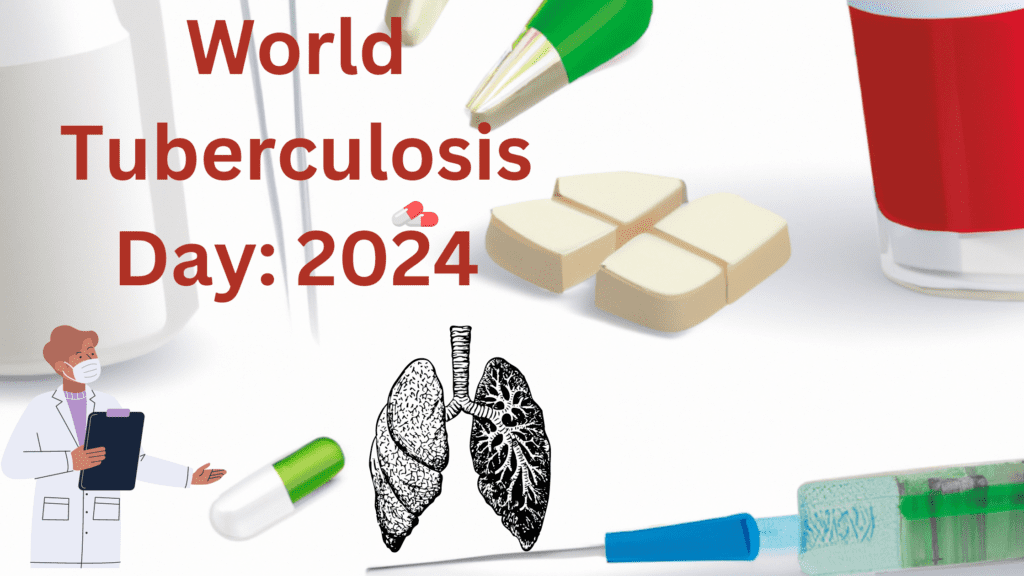
Every year on March 24th, the world comes together to observe World Tuberculosis Day 2024. This crucial day serves as a powerful reminder of the ongoing fight against TB, a devastating infectious disease that continues to claim countless lives worldwide.
What is Tuberculosis?
Lungs are the main organs affected by tuberculosis (TB), a potentially fatal bacterial illness. It is brought on by Mycobacterium tuberculosis and is airborne when an infected person coughs, sneezes, or speaks. Extrapulmonary tuberculosis (TB) can result from the germs spreading to other areas of the body, even though pulmonary tuberculosis usually affects the lungs. TB symptoms can include fatigue, fever, night sweats, weight loss, and a chronic cough.
The Global Impact of TB: World Tuberculosis Day 2024
Even with recent years’ tremendous advancements, tuberculosis still poses a serious risk to public health. As per the World Health Organization (WHO), approximately 10 million individuals contracted tuberculosis (TB) in 2021, with 1.5 million succumbing to the illness. Notably, low- and middle-income countries bear a disproportionate share of the burden of tuberculosis..
Historical Context and Why World TB Day Matters:
Before 1882, tuberculosis (TB) was still a mystery that caused much terror and destruction. But that year also saw the groundbreaking discovery of the TB bacillus by Dr. Robert Koch, which opened the door to diagnosis, treatment, and eventually the creation of World TB Day in 1982. This day acts as a worldwide call to action, bringing attention to the illness and encouraging ongoing efforts to eradicate it.
Diagnosis and Treatment of TB:
Effective TB care depends on early diagnosis and treatment. There are several ways to diagnose tuberculosis (TB), such as sputum tests, skin tests, and chest X-rays. A course of antibiotics administered over a number of months is the conventional treatment for tuberculosis. The major difficulty is preventing drug-resistant tuberculosis (TB) by finishing the entire course of treatment.
Preventing the Spread of TB: World Tuberculosis Day 2024
When a person with tuberculosis coughs, sneezes, or speaks, the infection is mostly transmitted through the air. Maintaining a healthy lifestyle, covering coughs and sneezes with tissues, and practicing adequate ventilation can all greatly lower the chance of transmission. In many nations, babies are also vaccinated against severe forms of tuberculosis (TB) with the BCG vaccination.
Looking Forward: Efforts to End TB:
The WHO and the Stop TB Partnership are two international organizations that are actively pursuing the lofty target of eliminating tuberculosis by 2030. Research and development of novel diagnostics, vaccines, and treatments are being undertaken as part of these efforts, which also aim to address the societal drivers of tuberculosis transmission and provide greater access to current interventions.
What You Can Do:
You can play a vital role in the fight against TB by:
- Educating yourself and others about TB symptoms, prevention methods, and available resources.
- Supporting organizations working towards ending TB through donations, volunteering, or advocacy efforts.
- Encouraging increased funding and research for TB control programs.
World TB Day serves as a reminder that, despite ongoing efforts to combat the disease, a world free of tuberculosis is achievable. Through collaborative efforts, education, and ongoing advancements, we may eventually eradicate tuberculosis and guarantee a better future for everybody.
The Global Impact of TB: A Pressing Public Health Concern
Even with great advancements in recent years, tuberculosis (TB) still poses a serious risk to public health. The World Health Organization (WHO) estimates that 10 million individuals will contract tuberculosis (TB) in 2021; tragically, 1.5 million of those cases will result in death. Since low- and middle-income nations bear a disproportionate share of the TB burden, social and economic variables that fuel the disease’s spread must be addressed.
From Discovery to Action: A Historical Context and the Significance of World TB Day: World Tuberculosis Day 2024
The long path towards scientific understanding and treatment of tuberculosis is evident throughout its history. Before 1882, tuberculosis (TB) was still a mystery that caused much terror and destruction. But that year also saw the groundbreaking discovery of the TB bacillus by Dr. Robert Koch, which opened the door to diagnosis, treatment, and eventually the creation of World TB Day in 1982. This yearly occasion acts as a global call to action, promoting ongoing efforts to eradicate tuberculosis.
Diagnosing and Treating TB: Effective Strategies for Managing the Disease:
Effective TB diagnosis and treatment are essential for controlling the illness and stopping its spread. There are several ways to diagnose tuberculosis (TB), such as sputum tests, skin tests, and chest X-rays. Antibiotics are administered in combination over several months as part of the conventional treatment. Completing the entire course of therapy is essential, as discontinuing too soon might result in the development of drug-resistant tuberculosis, which presents a serious obstacle.
Preventing the Spread of TB: Essential Measures for Collective Action
Collective action and awareness are necessary to stop the spread of tuberculosis. Essential precautions include concealing coughs and sneezes with tissues and maintaining adequate ventilation, particularly in crowded areas. A healthy lifestyle can also boost immunity and lower the chance of contracting tuberculosis. In certain nations, newborns are given the BCG vaccination as a means of preventing serious tuberculosis.
A Global Fight: Efforts Towards Ending TB in 2030
The Stop TB Partnership and the World Health Organization are two of the leading global initiatives against tuberculosis. These organizations strive to eradicate tuberculosis by 2030. Their work focuses on addressing the social determinants of health that contribute to the spread of tuberculosis (TB) as well as expanding access to current interventions and conducting research into new diagnostics, vaccines, and treatments.
Read More- Lower risk of Alzheimer’s Disease to Men Who take Viagra- A Study